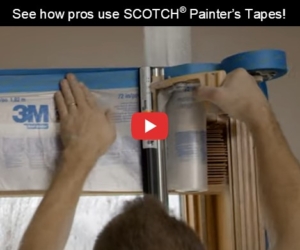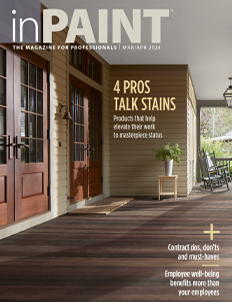Think like your client to land commercial work
 Sometimes, the only way to know if your customer thinks you performed well on a project is whether they hire you back for another project. When it comes to commercial work, it also helps to understand what commercial property managers and executives are really looking for in a paint crew that delivers beyond finishing the job on time and on budget.
Sometimes, the only way to know if your customer thinks you performed well on a project is whether they hire you back for another project. When it comes to commercial work, it also helps to understand what commercial property managers and executives are really looking for in a paint crew that delivers beyond finishing the job on time and on budget.
To help ensure your next commercial job delivers precisely what your client is looking for, here’s a glimpse into the mind-set of two commercial property executives who regularly hire painting contractors:
MOST IMPORTANT ATTRIBUTES
Competence is what those in hiring positions are looking for, says Brandye Coley, real estate manager with CBRE Phoenix Asset Services in Arizona. Competence involves a mix of many attributes, like, “communication and responsiveness; knowledge of what’s happening in their industry; professionalism; and timeliness,” she explains.
DECIDING DETAILS
What helps her hire one paint pro over another may be in the details, Coley adds. In your proposal, make sure you include not just specifics about the cost, the warranty you offer, and the schedule you’ll adhere to, but spell out inclusions and exclusions, she said.
Describe the prep work in detail and include in your estimate or proposal whether you will pressure wash, scrape, wire-brush and/or crack seal, and to what limit (1/4”, half inch, etc.). Specify prep for other small job details too, like if the estimate includes trash enclosures, bike racks, pony walls, bollards (short posts), and curbs.
In addition to cost, schedule and warranty offered, contractors look to a painter’s reputation and his or her references as key factors in hiring decisions.
BE READY TO ANSWER QUESTIONS
The next time she issues an RFP, Coley intends to include more questions about, “the schedule and ability to complete the job on time, as well as the overall job cost, professionalism and care on the job site.”
Her questions will include:
1) Do you own or rent equipment, such as sprayers, lifts, etc.?
2) How many prep people and how many painters do you schedule for each job?
3) Do you use temporary labor?
4) What is your plan for storing your materials and equipment on the job site?
5) Will you appoint one specific job foreman or supervisor who will be on-site the whole time, or at least checking on the project once daily?
6) How will your crew handle the need for breaks and restroom use? This is of concern, Coley said, because, “I have had painting crews who used the empty trash enclosure or landscape areas as a restroom, or to nap while on a break, or leave their trash and debris in the landscaping or parking lot.”




